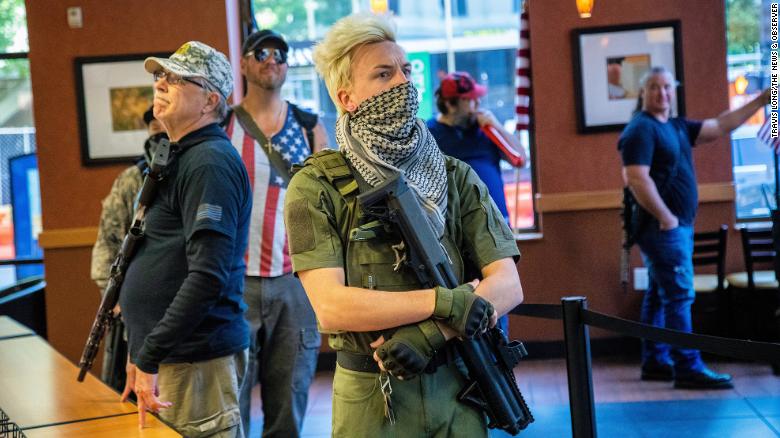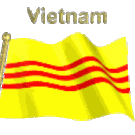Boogaloo Extremists
Page 1 of 1 • Share
 Boogaloo Extremists
Boogaloo Extremists
Gun-toting members of the Boogaloo movement are showing up at protests
Benjamin Ryan Teeter was at his home in Hampstead, N.C., when the call to action came. It was an alert from the heart of the raging protests in Minneapolis, posted on an online forum by a fellow member of the Boogaloo movement, a loosely knit group of heavily armed, anti-government extremists.
The "alert" was from a man who had a run-in with the Minneapolis police while on the frontline of the police-brutality protests set off by the death of George Floyd.
"He caught mace to the face," said Teeter, and "put out a national notice to our network."

Benjamin Ryan Teeter, front, during a stay-at-home order protest in Raleigh N.C. last month.
After Teeter -- who goes by Ryan -- said he saw the online posting, he and a handful of other Boogaloo friends in the area mobilized.
They grabbed their guns -- mostly assault rifles -- hopped into their vehicles, and made the 18-hour trek to Minneapolis.
The Boogaloos are an emerging incarnation of extremism that seems to defy easy categorization. They are yet another confounding factor in the ongoing effort among local, state and federal officials to puzzle out the political sympathies of the agitators showing up to the mostly peaceful George Floyd rallies who have destroyed property, looted businesses, or -- in the case of the Boogaloos who descended on Minneapolis -- walked around the streets with assault rifles.
Boogaloo members appear to hold conflicting ideological views with some identifying as anarchists and others rejecting formal titles. Some pockets of the group have espoused white supremacy while others reject it. But they have at least two things in common: an affinity for toting around guns in public and a "boogaloo" rallying cry, which is commonly viewed as code for another US civil war.
Megan Squire, a computer science professor at Elon University in North Carolina who monitors online extremism, said the movement started in obscure online platforms.
It "is now growing on mainstream platforms, and in this moment of protest it is starting to move offline," she said. "It resembles the militia movement that came before it, which has been well documented as a force for promoting violence."
Teeter, in an interview with CNN, said he identifies as an anarchist. His mission in Minneapolis, he said, was to protect protesters from police abuse and white supremacists, whom he deplores.
"If people are going to initiate deadly force against us, we need to be willing and able to initiate deadly force in return," Teeter, 22, said.
Despite the presence of Teeter, and he said a dozen or so of his compatriots, federal, state and local officials have put forth little evidence so far to suggest widespread organization and mobilization by any one ideological group. A CNN review of the backgrounds of those arrested during the first three days of protests in Minneapolis did not surface any obvious links to known organizations.
Some police said they suspect that much of the rioting and looting was perpetrated not by ideological extremists, but smaller groups of criminal opportunists seeking to profit by stealing merchandise.
"These are straight up criminals. These are not protestors," said one high-ranking LAPD official. In Los Angeles, he said, roving bands of thieves drove around in cars and communicated by cellphone, identifying businesses to loot.
Still, there are some documented reports of group-affiliated individuals from the left and right of the extremist spectrum mingling amid the less organized.
Gun-toting Boogaloo members have appeared at George Floyd protests in Minneapolis, Salt Lake City, Dallas, Atlanta and elsewhere, according to The Washington Post.
Known for sporting Hawaiian shirts and arriving to public protests heavily armed, the decentralized Boogaloo movement -- sometimes referred to as the "Boogaloo Bois" -- is often associated with the far-right.
Benjamin Ryan Teeter was at his home in Hampstead, N.C., when the call to action came. It was an alert from the heart of the raging protests in Minneapolis, posted on an online forum by a fellow member of the Boogaloo movement, a loosely knit group of heavily armed, anti-government extremists.
The "alert" was from a man who had a run-in with the Minneapolis police while on the frontline of the police-brutality protests set off by the death of George Floyd.
"He caught mace to the face," said Teeter, and "put out a national notice to our network."

Benjamin Ryan Teeter, front, during a stay-at-home order protest in Raleigh N.C. last month.
After Teeter -- who goes by Ryan -- said he saw the online posting, he and a handful of other Boogaloo friends in the area mobilized.
They grabbed their guns -- mostly assault rifles -- hopped into their vehicles, and made the 18-hour trek to Minneapolis.
The Boogaloos are an emerging incarnation of extremism that seems to defy easy categorization. They are yet another confounding factor in the ongoing effort among local, state and federal officials to puzzle out the political sympathies of the agitators showing up to the mostly peaceful George Floyd rallies who have destroyed property, looted businesses, or -- in the case of the Boogaloos who descended on Minneapolis -- walked around the streets with assault rifles.
Boogaloo members appear to hold conflicting ideological views with some identifying as anarchists and others rejecting formal titles. Some pockets of the group have espoused white supremacy while others reject it. But they have at least two things in common: an affinity for toting around guns in public and a "boogaloo" rallying cry, which is commonly viewed as code for another US civil war.
Megan Squire, a computer science professor at Elon University in North Carolina who monitors online extremism, said the movement started in obscure online platforms.
It "is now growing on mainstream platforms, and in this moment of protest it is starting to move offline," she said. "It resembles the militia movement that came before it, which has been well documented as a force for promoting violence."
Teeter, in an interview with CNN, said he identifies as an anarchist. His mission in Minneapolis, he said, was to protect protesters from police abuse and white supremacists, whom he deplores.
"If people are going to initiate deadly force against us, we need to be willing and able to initiate deadly force in return," Teeter, 22, said.
Despite the presence of Teeter, and he said a dozen or so of his compatriots, federal, state and local officials have put forth little evidence so far to suggest widespread organization and mobilization by any one ideological group. A CNN review of the backgrounds of those arrested during the first three days of protests in Minneapolis did not surface any obvious links to known organizations.
Some police said they suspect that much of the rioting and looting was perpetrated not by ideological extremists, but smaller groups of criminal opportunists seeking to profit by stealing merchandise.
"These are straight up criminals. These are not protestors," said one high-ranking LAPD official. In Los Angeles, he said, roving bands of thieves drove around in cars and communicated by cellphone, identifying businesses to loot.
Still, there are some documented reports of group-affiliated individuals from the left and right of the extremist spectrum mingling amid the less organized.
Gun-toting Boogaloo members have appeared at George Floyd protests in Minneapolis, Salt Lake City, Dallas, Atlanta and elsewhere, according to The Washington Post.
Known for sporting Hawaiian shirts and arriving to public protests heavily armed, the decentralized Boogaloo movement -- sometimes referred to as the "Boogaloo Bois" -- is often associated with the far-right.
_________________


8DonCo
 Re: Boogaloo Extremists
Re: Boogaloo Extremists
Ìf this group gets more popular, soon U.S. will have civil war between them and the white supremacist. I hope/pray NOT.

KatN
 Re: Boogaloo Extremists
Re: Boogaloo Extremists
tụi nầy âm thầm trả thù cảnh sát vì giết leader của nó ???
On March 12, 2020, a boogaloo Facebook group leader named Duncan Lemp was shot and killed by police in a no-knock raid of his home in Potomac, Maryland. Police had obtained the search warrant based on a tip that Lemp was violating a restriction from possessing firearms, though Lemp's family has contested that he was under any such restriction.
[20] Lemp's family has also asserted that he was asleep when he was killed by police.[21] Some far-right groups have theorized that Lemp was killed by police for his anti-government beliefs and his position in the boogaloo movement.[7] J. J. MacNab, a fellow of the George Washington University extremism program, has described Lemp as a "martyr" of the boogaloo movement, and warned that the increase in anti-police sentiment among boogaloo group members following his death may lead to violence against the police in the "foreseeable future".[3] A Facebook user who was later identified as Aaron Swenson was arrested on April 11, 2020 in Texas, after streaming a live video on Facebook in which he stated he was driving around looking for police officers to ambush. He was apprehended after a high-speed police chase, and found to be wearing a bulletproof vest and carrying loaded firearms and ammunition. Swenson had shared boogaloo memes on his Facebook page, and other members of the movement watched and commented during his livestream. Swenson had also posted a photo to Facebook the day after the shooting of Duncan Lemp, in which he wore a Hawaiian shirt and combat vest and used the hashtag "#HisNameWasDuncan".[7][22]
Some boogaloo groups joined the protests against law enforcement that occurred across the United States in May and June 2020 in response to the killing of George Floyd.[8][9] According to Vice, although the boogaloo groups tried to position themselves as allies of the Black Lives Matter movement, they generally avoided addressing police brutality as a racial issue.[8] Some members of boogaloo groups said they were attending protests to provide protection, either to the protesters or to stores. Posts in some online boogaloo groups called for their members to loot police stations and set fire to government buildings; some encouraged actions emulating the "rooftop Koreans", a reference to Korean store owners who shot at looters from roofs during the 1992 Los Angeles riots.[23] However, the posts do not appear to have resulted in any such actions by boogaloo group members, and though there have been reports that members inserted themselves among protesters to instigate violence, they have not been substantiated.[9][23]
On March 12, 2020, a boogaloo Facebook group leader named Duncan Lemp was shot and killed by police in a no-knock raid of his home in Potomac, Maryland. Police had obtained the search warrant based on a tip that Lemp was violating a restriction from possessing firearms, though Lemp's family has contested that he was under any such restriction.
[20] Lemp's family has also asserted that he was asleep when he was killed by police.[21] Some far-right groups have theorized that Lemp was killed by police for his anti-government beliefs and his position in the boogaloo movement.[7] J. J. MacNab, a fellow of the George Washington University extremism program, has described Lemp as a "martyr" of the boogaloo movement, and warned that the increase in anti-police sentiment among boogaloo group members following his death may lead to violence against the police in the "foreseeable future".[3] A Facebook user who was later identified as Aaron Swenson was arrested on April 11, 2020 in Texas, after streaming a live video on Facebook in which he stated he was driving around looking for police officers to ambush. He was apprehended after a high-speed police chase, and found to be wearing a bulletproof vest and carrying loaded firearms and ammunition. Swenson had shared boogaloo memes on his Facebook page, and other members of the movement watched and commented during his livestream. Swenson had also posted a photo to Facebook the day after the shooting of Duncan Lemp, in which he wore a Hawaiian shirt and combat vest and used the hashtag "#HisNameWasDuncan".[7][22]
Some boogaloo groups joined the protests against law enforcement that occurred across the United States in May and June 2020 in response to the killing of George Floyd.[8][9] According to Vice, although the boogaloo groups tried to position themselves as allies of the Black Lives Matter movement, they generally avoided addressing police brutality as a racial issue.[8] Some members of boogaloo groups said they were attending protests to provide protection, either to the protesters or to stores. Posts in some online boogaloo groups called for their members to loot police stations and set fire to government buildings; some encouraged actions emulating the "rooftop Koreans", a reference to Korean store owners who shot at looters from roofs during the 1992 Los Angeles riots.[23] However, the posts do not appear to have resulted in any such actions by boogaloo group members, and though there have been reports that members inserted themselves among protesters to instigate violence, they have not been substantiated.[9][23]
_________________


8DonCo
 Re: Boogaloo Extremists
Re: Boogaloo Extremists
noi' va^.y ho^~m ra`y bie?u ti`nh cho^ng' fa' cuo*'p gia^.t ho. cu~ng co' tham gia trong đo' ???
_________________
Một ngày như mọi ngày..
Đi vào lại đi ra..

Newtexas
 Re: Boogaloo Extremists
Re: Boogaloo Extremists
Những gì mình viết hổm rày đều từ từ lòi ra hết . Tụi phát xít đi khủng bố để bôi nhọ lên chính nghĩa của người biểu tình . Cũng nhờ tụi phát xít mà lão chump "táp phải ruồi" thắng ghế tổng thống hồi năm 2016 . Cho nên lâu lâu lão chump phải làm "hài lòng cử tri" mà tweet twat bậy bạ khuyến khích chia rẻ xã hội và ...theo ngôn ngữ Việt cộng ngày nay, là "cái kết" là .....bạo động thêm ....
_________________
LOCK CHUMP UP !
HEY CHUMP! YOU'RE FIRED
CHUMP AKA THE BIG LIE






Tu* Khoai
Page 1 of 1
Permissions in this forum:
You cannot reply to topics in this forum
 Home
Home